Handel trips back to the future as Lyric Opera proclaims the outrageous genius of ‘Rinaldo’
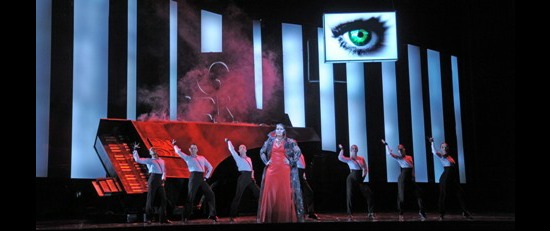 Review: “Rinaldo,” by Georg Frideric Handel, at the Lyric Opera of Chicago through March 24. ****
Review: “Rinaldo,” by Georg Frideric Handel, at the Lyric Opera of Chicago through March 24. ****
By Nancy Malitz
The Lyric Opera curtain rose upon a lipstick-red serpentine wall, with the evening’s war prize, Jerusalem, spelled out as letter building blocks jumbled in a pile — a tantalizing illusion, like a moon just out of arm’s reach. Then came the players in this fast-action fantasy, intrepid adventurers with eye-popping looks from some future-ancient cutting edge.
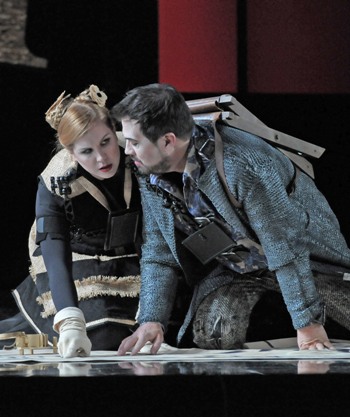 This was not going to be your grandfather’s Handel. This was going to be “Rinaldo” as the fearless vision of the Next Generation who will change everything. It would channel the brash energy of the composer George Frideric H. at 25, about to take on London with a flamboyant producer his own age, to make their mark with unmistakable musical genius and in-your-face novelty.
This was not going to be your grandfather’s Handel. This was going to be “Rinaldo” as the fearless vision of the Next Generation who will change everything. It would channel the brash energy of the composer George Frideric H. at 25, about to take on London with a flamboyant producer his own age, to make their mark with unmistakable musical genius and in-your-face novelty.
And so, the Lyric’s new production, which opened Feb. 29, had the impact of most such highly distinctive endeavors. People left in droves at first intermission. And people stayed and cheered.
The plot was never much in this opera, even 301 years ago, back on Feb. 24, 1711. It’s fine by me that director Francisco Negrin and designer Louis Désiré chose to color-code the good guys (in black, with gunmetal tulle) and the bad guys (in shiny red, with carpet swatches). The tactic worked in the movies “Star Wars,” the comic books “Spider-Man,” the video games “Final Fantasy,” all of them serious achievements in their own factless-filled genres. Besides, “Rinaldo’s” not about a war, not really. It’s a quest-saga for lusty characters in successive situations of love and danger, with great, great music for everyone.
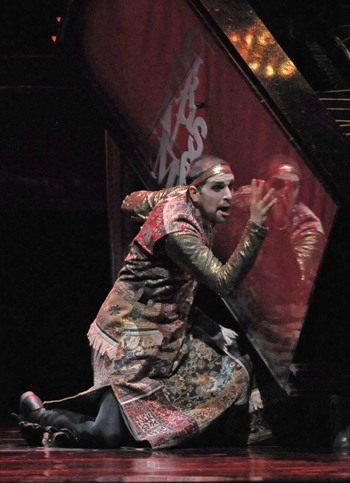 Modern opera-goers accustomed to continuously composed music in great arcs often find the Baroque structure of short scenes for just one or two singers to be predictable, stilted and boring. This is where the creative team’s job comes in, and one cannot emphasize enough the overall achievement of conductor Harry Bicket, choreographer Ana Yepes and lighting designer Bruno Poet, who worked with Negrin, Désiré and the talented cast of singers and dancers to expose the lively and varied narrative inherent in these sparkling mosaic gems.
Modern opera-goers accustomed to continuously composed music in great arcs often find the Baroque structure of short scenes for just one or two singers to be predictable, stilted and boring. This is where the creative team’s job comes in, and one cannot emphasize enough the overall achievement of conductor Harry Bicket, choreographer Ana Yepes and lighting designer Bruno Poet, who worked with Negrin, Désiré and the talented cast of singers and dancers to expose the lively and varied narrative inherent in these sparkling mosaic gems.
David Daniels, the long-celebrated American countertenor, starred as the proud and self-indulgent Rinaldo, and his centerpiece aria “Cara sposa,” upon the kidnapping of his sweetheart, was the beautifully honed artistic moment one has come to expect. It is a very long night for the hero, and Daniels proved quite capable of whipping the wind (“Venti, turbini”) and matching wits with a passionately unstable sorceress, even if he seemed to be pulling from final reserves to summon those trumpets to battle (“Or la tromba”) at opera’s end.
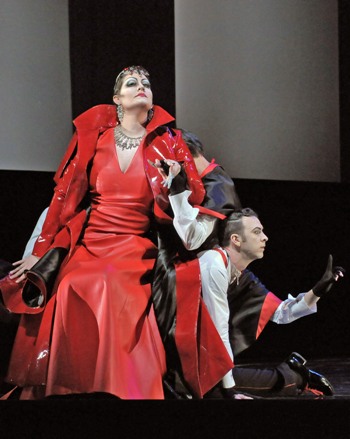 It’s a credit to the entire cast that Daniels functioned as an ensemble player in a group of very fine, often screamingly funny, singing actors. And throughout the performance, one was aware of wonderful vocal feats matched by ingenious orchestrations that deftly set the scene – solos for oboe, cello, violin or bassoon; choirs of strings or hissing reeds; harmonies lush, ornery or hollow; rhythms jagged or sinuous, even some syncopations that Brubeck would have smiled at.
It’s a credit to the entire cast that Daniels functioned as an ensemble player in a group of very fine, often screamingly funny, singing actors. And throughout the performance, one was aware of wonderful vocal feats matched by ingenious orchestrations that deftly set the scene – solos for oboe, cello, violin or bassoon; choirs of strings or hissing reeds; harmonies lush, ornery or hollow; rhythms jagged or sinuous, even some syncopations that Brubeck would have smiled at.
Handel knew what he was doing, of course. Just about the time you think he has exhausted his instrumental possibilities, there comes the amazing Act II number for the evil sorceress Armida, who’s mad at everybody (soprano Elza van den Heever, she of clarion high notes, lightning coloratura and a huge talent for camp). What ensues is a knock-down dragout for soprano and harpsichord that starred Handel himself at the keyboard in 1711. His present-day stand-in was Jory Vinokour, the virtuoso in the pit, while Armida mugged onstage like Jerry Lee Louis at a huge, floating harpsichord-casket-thingy with chandelier aspirations. I won’t tell you how it ends, but the performance was smokin’.
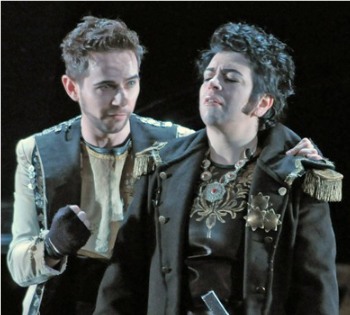 The characters each had fine moments. The contralto Sonia Prina, as the good guy General Goffredo, was so convincing in her trouser role as warrior, father and peacemaker that one forgot she is a woman. She held her own hardily against the agile bass Luca Pisaroni in his juicy role as the bad guy, Argante, King of Jerusalem. He burst onto the scene with pyrotechnical whines about his bad luck (“Sibillar gli angui d’Aletto”) and almost never went anywhere without his carpet skirt, his feather headdress or the adoring minions in his balletic entourage; they mimicked his little miracles of comic timing. One could almost forgive the good guys for giving him and his sorceress a pardon at the end of the show, for style points if not for moral merit.
The characters each had fine moments. The contralto Sonia Prina, as the good guy General Goffredo, was so convincing in her trouser role as warrior, father and peacemaker that one forgot she is a woman. She held her own hardily against the agile bass Luca Pisaroni in his juicy role as the bad guy, Argante, King of Jerusalem. He burst onto the scene with pyrotechnical whines about his bad luck (“Sibillar gli angui d’Aletto”) and almost never went anywhere without his carpet skirt, his feather headdress or the adoring minions in his balletic entourage; they mimicked his little miracles of comic timing. One could almost forgive the good guys for giving him and his sorceress a pardon at the end of the show, for style points if not for moral merit.
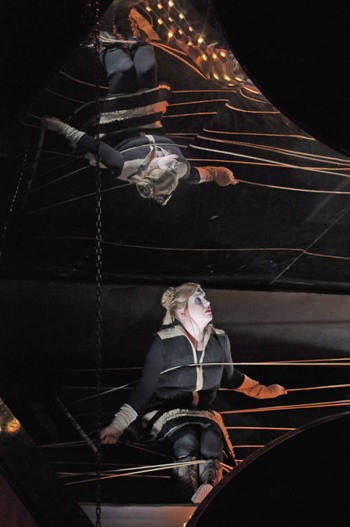 Rinaldo’s love interest is Almirena, the general’s daughter, and it’s to soprano Julia Kleiter’s credit, in her first Handel role onstage, that she didn’t pale by comparison with the evil sorceress. Quite the contrary, Kleiter showed her own kind of spunk, and she cast a spell with her famous aria of grief, “Lascia ch’io pianga,” exquisitely sung in pigtails while tangled in harpschord wire.
Rinaldo’s love interest is Almirena, the general’s daughter, and it’s to soprano Julia Kleiter’s credit, in her first Handel role onstage, that she didn’t pale by comparison with the evil sorceress. Quite the contrary, Kleiter showed her own kind of spunk, and she cast a spell with her famous aria of grief, “Lascia ch’io pianga,” exquisitely sung in pigtails while tangled in harpschord wire.
The young English countertenor Iestyn Davies, as the general’s brother Eustazio, proved to be a find as well. The only time in the evening I regretted one of Harry Bicket’s artful cuts in the music was at the end of Act 1, when Eustazio is trying to put some wind back into the sails of the heartbroken Rinaldo with “Col valor.” Hearing the customary B-section and repeat would have been pleasurable indeed.
The dancers were a delight throughout, underscoring the musical forms and adding quirky visual commentary to twists and turns in the story. So many orchestral players had solo turns that there isn’t room to name them, but Lisette Kielson on the recorder in Act 1, while Almirena summons the birds, evokes a whole aviary. Bicket led a musical performance overall that was sophisticated, elegant, crisply fresh. He was at the center of the dazzle, marshalling the endeavor to bring into focus Handel’s astonishing music, abundantly varied, almost cavalierly genius. That’s “Rinaldo’s” beating heart.
Related Links:
- Listen to an audio intro to the show with sound clips: Go to lyricopera.org
- Iestyn Davis, the countertenor who sings Eustazio, performed with Chicago’s Baroque Band in March: Read the review at Chicago On the Aisle
- Performance location, dates and times: Go to TheatreinChicago.com
Tags: Chicago Lyric Opera, David Daniels, Elza van den Heever, Francisco Negrin, Handel, Harry Bicket, Iestyn Davies, James Kryshak, Julia Kleiter, Louis Desire, Luca Pisaroni, Lyric Opera of Chicago, Rinaldo, Sonia Prina

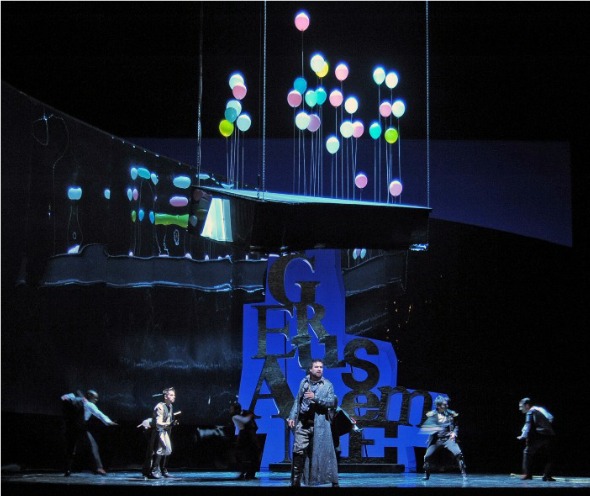


Oh, I listened on the radio and was absolutely gutted by the Col Valor cut. Iestyn started ornamenting the first repeat and my heart sank as I realized they were going to cut the B and the Da Capo. It’s not that great of a piece, but it’s probably Eustazio’s best…
Oh, I listened on the radio and was absolutely gutted by the Col Valor cut. Iestyn started ornamenting the first repeat and my heart sank as I realized they were going to cut the B and the Da Capo. It’s not that great of a piece, but it’s probably Eustazio’s best…